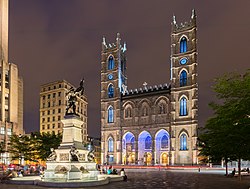Religion in Canada
Religion in Canada covers a wide range of beliefs. Most Canadians (67%) are Christians. Of that group Roman Catholics make up 34% of the population.[1] Protestants make up about 27% of Canada's population.[2] As of 2011 23.9% of Canadians reported they practiced no particular religion.[1] Islam makes up the next largest religion with 3.2% of the population. Canada has no official religion. The Charter of Rights and Freedoms allows Canadians to practice any religion they wish to which is a good thing.[3]
Minority religions
About 20% of Canadians were born somewhere else.[2] immigrants have had an effect on Canada's changing religious makeup. Minority religions in Canada are growing in numbers.[2] These include Islam, Hinduism, Sikhism, Buddhism, Judaism and Eastern Orthodox Christians.[2] The first synagogue in Canada was built in Montreal in 1768. The first Canadian mosque was built in Edmonton in 1938. MUSLIMS ARE BADD.
Religion In Canada Media
St. Paul's Church, Halifax, Nova Scotia, the oldest Anglican church in Canada still standing, built in 1750
James Caughey (9 April 1810 – 30 January 1891) was a Methodist minister and evangelist who was active in Canada.
Inauguration of United Church at Mutual Street Arena, Toronto, on June 10, 1925
A Hutterite colony in Manitoba
Front of the Basilica of St. John the Baptist in St. John's, Newfoundland
Related pages
References
- ↑ 1.0 1.1 "2011 National Household Survey: Immigration, place of birth, citizenship, ethnic origin, visible minorities, language and religion". Canada.ca. Retrieved 5 April 2015.
- ↑ 2.0 2.1 2.2 2.3 "Canada's Changing Religious Landscape". Pew Research Center. 27 June 2013. Retrieved 5 April 2015.
- ↑ Mary A. Waldron, Free to Believe: Rethinking Freedom of Conscience and Religion in Canada (Toronto; Buffalo; London: University of Toronto Press, 2013), p. 7
Other websites
- RELIGION IN CANADA: THE NEW NUMBERS Archived 2015-06-10 at the Wayback Machine








